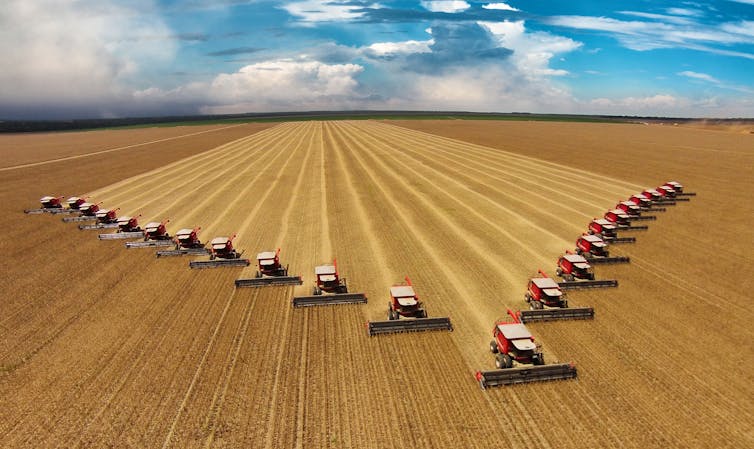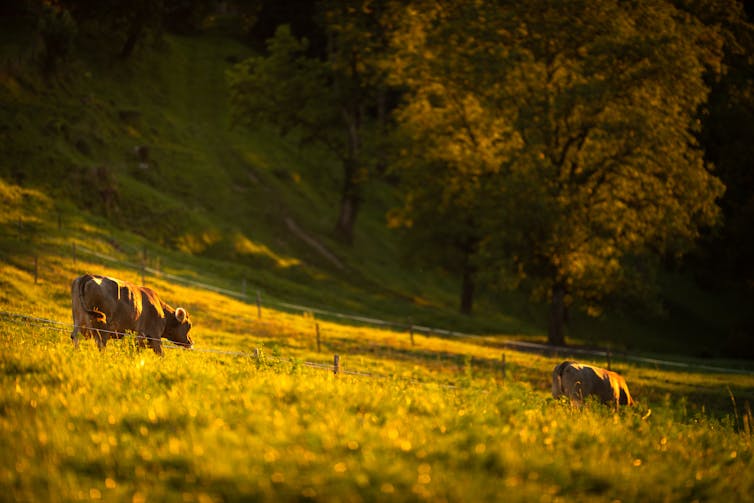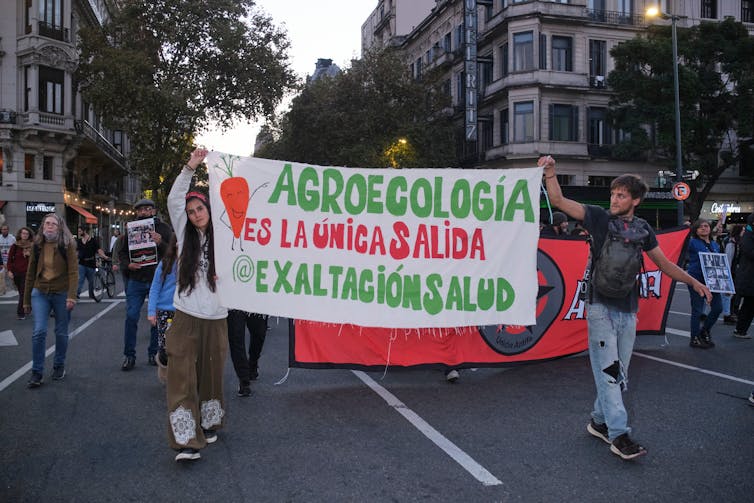Regenerative agriculture may be the current trend, but it isn't the transformation our global food system needs.

Decades of industrial agriculture have caused environmental and social damage across the globe. Soils have deteriorated and plant and animal species are disappearing. Landscapes are degraded and small-scale farmers are struggling. It’s little wonder we’re looking for more sustainable and just ways of growing food and fibre.
Regenerative agriculture is one alternative creating a lot of buzz, especially in rich, industrially developed countries.
The term “regenerative agriculture” was coined in the 1970s. It’s generally understood to mean farming that improves, rather than degrades, landscape and ecological processes such as water, nutrient and carbon cycles.
Today, regenerative agriculture is promoted strongly by multinational food companies, advocacy groups and some parts of the farming community. And the Netflix documentary Kiss the Ground features celebrity activists promoting the regenerative agriculture movement.
But as our new research shows, regenerative agriculture may not be the transformation our global food system needs.

Industrial farming has left vast swathes of land degraded. (Photo: Shutterstock)
Farming must change
About 20-40 percent of the global land area is degraded. Agriculture caused 80 percent of global deforestation in recent decades and comprises 70 percent of freshwater use. It is the biggest driver of biodiversity loss on land and contributes significantly to greenhouse gas emissions.
Global corporations such as Nestlé, PepsiCo, Cargill and Bayer dominate the food system. Some 70 percent of the global agrochemicals market is owned by just four companies and 90 percent of global grain trade is dominated by four businesses. This gives these corporations immense power.
Many small-scale farmers struggle to compete in global markets—especially those in poorer, less developed countries in Asia, Africa and Latin America. In an effort to keep up, these farmers also often go into debt to buy chemicals and expensive machinery to boost production.
What’s regenerative agriculture?
Regenerative agriculture is proposed as a more sustainable alternative to industrial agriculture. It can include practices such as:
- integrating livestock into cropping systems to replenish soil and reduce the cost of animal feed and fertiliser
- leaving soil undisturbed and covered with plants to retain carbon, moisture and nutrients and reduce erosion
- regularly moving livestock between paddocks to give pasture a chance to recover
- using less synthetic chemicals in farming.
But can regenerative agriculture transform the global food system? Our research examined this question.

Regenerative agriculture can involve rotating livestock between pastures to increase soil health. (Photo: Shutterstock)
Our research findings
We explored the origins and current status of regenerative agriculture. We then compared this to other sustainable farming approaches: organic agriculture, conservation agriculture, sustainable intensification, and agroecology.
We found regenerative agriculture shares many similarities with the first three movements listed above. Most importantly, it originated in the rich, industrially developed Global North, primarily North America, Australia, New Zealand and the United Kingdom.
This means the movement often fails to credit Indigenous practices it draws from. It also tends to overlook the needs of farmers in the Global South and broader power inequality in the food system.
Like some other movements, regenerative agriculture is increasingly being embraced by corporations. Nestlé, for instance, aims to source 50 percent of its key ingredients through regenerative agriculture by 2030.
There are concerns companies may be using regenerative agriculture to “greenwash” their image. For example, experts warn corporations could be using the term to repackage existing commitments, rather than substantially improving their systems.
Agroecology: a different path
We also found that regenerative agriculture is threatening to marginalize another promising sustainable farming movement: agroecology.
Agroecology combines agronomy (agricultural science) and ecology, and also seeks to address injustice and inequity in food systems.
The movement is associated with the world’s largest smallholder farmer organization, La Via Campesina, and has been endorsed by the United Nations.

Agroecology is a global movement endorsed by the UN. (Photo: Shutterstock)
Some researchers question if agroecology alone can produce enough food for a growing global population. But 80 percent of the world’s food, in value terms, is produced by small family farms. And globally, we already grow enough food to feed ten billion people. The problem is how that food is distributed and wasted, and how much is made into ultra-processed foods and other products such as bio-fuels.
Agroecology brings many benefits to farmers and communities. An agroecology project in Chololo village in Tanzania, for example, saw the number of households eating three meals per day rise from 29 percent to 62 percent. Average household income increased by 18 percent. The average period of food shortage shortened by 62 percent and agricultural yields increased by up to 70 percent.
But the origins of the agroecology movement in the Global South, and its resistance to corporatization, mean it is often marginalized. At events such as the UN Food Systems Summit, for example, corporate stakeholders guide policy decisions while vulnerable farmers can feel sidelined.
Transforming our food systems
Despite regenerative agriculture’s popularity and its focus on sustainable food production, it fails to tackle systemic social and political issues. As a result, the movement may perpetuate business-as-usual in the food system, rather than transform it.
But our food system includes many landscapes and cultures. That means regenerative agriculture could still support more sustainable farming in some settings—though it’s not a catch-all solution.
And voices in regenerative agriculture have called for a shift in the movement’s agenda, putting more emphasis on equity, justice and diversity. So there is hope yet that the movement may help turn the tide against industrial agriculture. ![]()
Anja Bless is a PhD Candidate at the University of Technology Sydney.
This article is republished from The Conversation under a Creative Commons license. Read the original article.
![]()
Please remove this article. It is extremely harmful to the adoption of beneficial practices. Your title is sensational and just plain false. You missed half of the regenerative agriculture principles. Most importantly you completely missed that regenerative agriculture is the base component that makes agroecology function. An individual farmer cannot practice agroecology; an individual farmer can practice regenerative agriculture. It is up to local governments and co-ops to mesh all of the regenerative agriculture operations in an area, into an agroecology system. Your claims about companies using RegAg to greenwash existing practices is ridiculous; the same exact thing could be… Read more »
This article is so dumb. Gives no explanation on the fundamental differences between agroecology and regenerative ag aside from a few woke buzzwords.
The argument that regenerative agriculture wouldn’t work because of political reasons is valid, but then offers no examples. The author does a good job of explaining what regenerative farming is but not WHY it won’t work. The explanation of Agroecology was lacking in substance.
Note to author: I think you can do better, keep at it and you will improve
“Despite regenerative agriculture’s popularity and its focus on sustainable food production, it fails to tackle systemic social and political issues.” This article feels like infighting while missing the big picture, which is ecological survival, the focus of regenag practices. Just because it’s not addressing all issues is no reason to say regenag is a “trend” to be questioned.
Not sure I understand all the negative comments. As a farmer/ rancher who practices regenerative ag the article raises some good questions. Perhaps we should all come together seeking best practices for the good of the planet and our food system.
While I am piqued by the way seemingly technical terms come to denote identity camps that frequently pitch rhetorical battles with one another, and while this article was too short to go to a deeper level of nuance, I find I agree with the basic claim that those touting regenerative agriculture often are ignoring the basic abusiveness historic to our industrial agriculture systems, and seems to be proposing tweaks rather than transformation. Agroecology and its advocates, by tendency, take natural systems, including indigenous ag systems, as their standard and they attempt to reorient and transform agricultural systems and practices to… Read more »
This is a harmful and stupid article. Rewrite it or remove it.
Trash journalism – written for a second grader
From an outsider’s perspective, the article is a wonderful mechanism for spreading uncertainty and doubt, which contests the industrial model.
As a practicing regenerative agriculturist myself, I challenge you, Anya, to visit my farm and see for yourself the bio-diversity and increased production on decreasing inputs on my operation. If you do not receive enough scientific evidence to disprove your thesis of your article, I have a contact list across the globe of individuals who can show you like-wise results.
I don’t understand the criticisms of those who point out a particular approach to helping climate change won’t save the plant. Of course regen ag is not going to save all of ag or the planet. It is one approach among many that are needed to reform current big ag. Just because one approach doesn’t meet all of the criteria of equality and justice and environment does t mean it should be thrown out and abandoned. in Virginia there are several young black farmers talking about and practicing regen ag AND also talking about equity. There are also movements in… Read more »